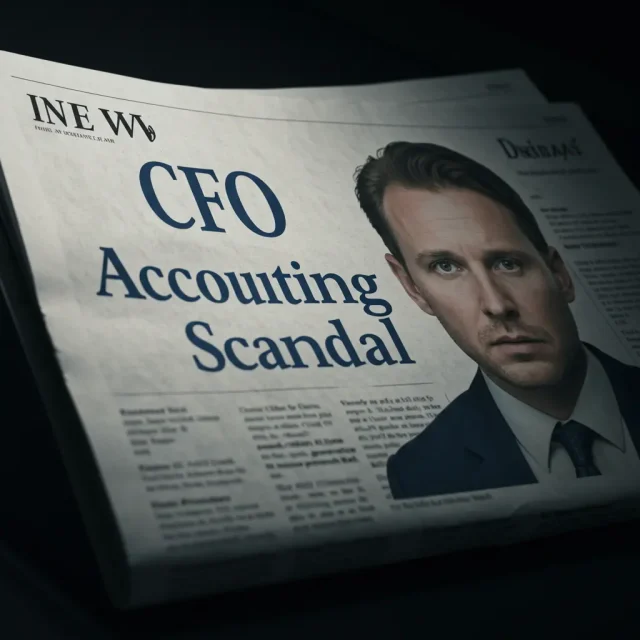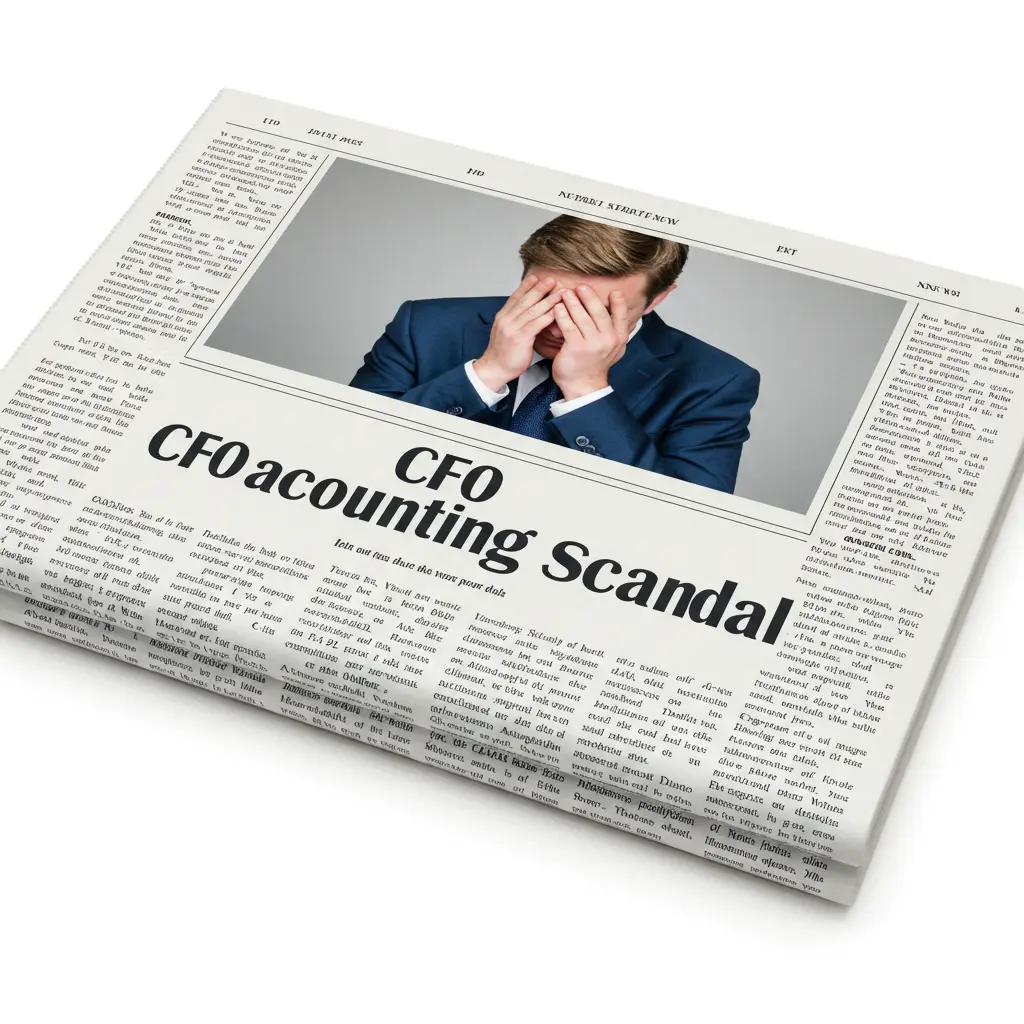When Audit Fails: What the Deloitte–Glencore Investigation Means for CFOs
Introduction:
When a major audit failure hits the headlines, CFOs and finance leaders can’t help but shudder. The recent news of the UK’s accounting watchdog investigating Deloitte’s audits of commodity giant Glencore is a stark reminder that even Big Four auditors can miss red flags. The Financial Reporting Council (FRC) is probing eight years of Deloitte’s audits of Glencore (2013–2020) to determine if the firm “gave sufficient consideration to the risk of non-compliance with laws and regulations” during those audits [The Guardian – Deloitte under FRC investigation]. This comes on the heels of Glencore’s massive £281 million fine in 2022 after the company pleaded guilty to multiple bribery charges – the largest corporate bribery penalty in UK history at the time [The Guardian – Glencore bribery fines]. In other words, serious compliance breaches slipped through years of audits. For CFOs, CEOs, and founders, such stories are a wake-up call. What happens when an audit fails? And more importantly, how can finance leaders ensure their company isn’t the next cautionary tale?
Audit Failures Have Real Consequences
High-profile audit failures aren’t just academic debates between regulators and accounting firms – they have real business consequences. In Glencore’s case, weak oversight allowed bribery and corruption to proliferate, resulting in enormous fines and lasting reputational damage. The fact that regulators are now questioning Deloitte’s work signals that auditors will be held to account when they fall short. And Glencore is not alone. Audit lapses have happened before with costly outcomes: for example, in April 2025 EY was fined nearly £5 million for “serious breaches” in its audits of Thomas Cook prior to the travel company’s collapse [The Guardian – EY fined for Thomas Cook audit failures]. In that case, the auditor admitted it failed to challenge management’s assumptions or apply sufficient skepticism – mistakes that, in hindsight, meant warning signs of Thomas Cook’s woes went unchecked. Each such failure underscores a key point: if auditors miss something, it likely means the company’s internal checks and balances failed first.
From a CFO’s perspective, an audit failure can be devastating. Financial restatements, regulatory investigations, plummeting stock value, and loss of stakeholder trust often follow. CFOs are often on the front lines of these crises, having to explain what went wrong in the financials and why controls didn’t prevent it. In some cases, CFOs themselves may face personal repercussions. (In the United States, for instance, laws like the Sarbanes–Oxley Act require CEOs and CFOs to personally certify the accuracy of financial reports, making them individually liable for misstatements. And the UK is considering reforms to empower its new regulator to sanction corporate directors for breaches in reporting and audit duties, signalling a push toward greater personal accountability for finance chiefs.) In short, when an audit fails, the buck often stops at the CFO’s desk – if not in legal terms, certainly in terms of responsibility to stakeholders.

Why the Deloitte–Glencore Case Matters to Finance Leaders
What makes the Deloitte–Glencore investigation especially pertinent for CFOs and financial controllers is how clearly it illustrates the danger of assuming “the auditors will catch it.” Here we have a FTSE 100 company, audited by a top firm, where serious misconduct (bribery across multiple countries) went on for years. It’s easy to think such glaring issues could never slip past a professional audit, yet they did. The lesson for finance leaders: you cannot solely rely on external auditors to flag compliance issues or financial irregularities. Auditors provide reasonable assurance, but management is responsible for the integrity of the financial statements and the control environment. As one UK parliament report bluntly stated, management often has incentives to “overstate the performance of the company,” whereas auditors can only check what they’re given and must contend with any gaps or obstacles management creates [UK Parliament – Audit reform briefing]. In Glencore’s case, if certain payments were disguised or off the books, no auditor could magically uncover them without some hint from within the company.
For CFOs, this means building a culture of transparency and compliance is not just “nice to have” – it’s essential. You want your audit to be a simple box-ticking exercise, not an archaeological dig. If there are potential legal or regulatory compliance risks (like the bribery risks in Glencore’s commodity trading operations), the CFO should ensure those are being proactively addressed and disclosed. The FRC’s focus on “non-compliance with laws and regulations” highlights that auditors are expected to evaluate things like bribery risk, money laundering controls, sanctions compliance, etc. But the primary responsibility for compliance rests with management, and finance leaders need to champion that internally.
Additionally, the Deloitte–Glencore saga is a reminder that even the biggest audit firms can have blind spots. In fact, the audit industry as a whole has seen rising scrutiny. The UK regulator issued a record £33.3 million in fines for audit failures in 2022 – an all-time high [CityAM – record audit fines]. In other words, audit quality issues are not rare. As a CFO or CEO, being aware of this context should prompt you to double-down on the quality of your own financial reporting and oversight.
Lessons for CFOs: How to Avoid Being the Next Headline
The good news is that audit failures at your company are preventable with the right approach. The experiences of Glencore, Thomas Cook, and other troubled audits provide a playbook of what not to do – and by inverse, what CFOs should be doing to ensure audit readiness. Here are some key lessons and action items for finance leaders:
-
Strengthen Internal Controls and Compliance: If there’s one thing the Glencore case screams, it’s the importance of a robust control environment. CFOs should ensure strong anti-fraud and compliance programs. Implement clear policies against unethical behavior (bribery, off-book arrangements) and make sure they’re enforced. Remember, auditors sample and test, but controls operate daily – a culture of integrity and well-designed controls will prevent most issues from arising in the first place.
-
Regular Balance Sheet Scrutiny: Don’t wait for year-end audit adjustments to discover problems. Perform monthly or quarterly balance sheet reconciliations and reviews. This practice is a game-changer for catching errors or oddities early. For instance, reconciling cash, receivables, and payables frequently can flag discrepancies that might indicate fraud or mistakes. Had Glencore’s finance team aggressively reconciled and investigated every account (including any suspicious “facilitation payments” or consulting fee outflows), perhaps some bribery payments would have surfaced internally. As finance leaders, treating balance sheet clean-up as an ongoing priority keeps your books accurate and “audit-ready” year-round.
-
Apply Professional Skepticism (Yes, CFOs Too): Auditors talk about “professional skepticism” – essentially, not taking things at face value and probing for evidence. CFOs should apply the same mindset within their teams. Challenge optimistic assumptions in forecasts, question valuations of hard-to-value assets, and double-check any areas of the financials that involve significant judgment. In the Thomas Cook audit, a major failing was not questioning the company’s goodwill valuation and going-concern assumptions despite clear signs the business was struggling [The Guardian – Thomas Cook audit failures]. As CFO, cultivate a healthy skepticism in your finance team: encourage them to ask “what could go wrong here?” about the numbers. It’s far better to identify and firm up any weak spots internally than to have your auditors (or worse, regulators) do it for you later.
-
Maintain Auditor Independence and Openness: Cozy relationships or poor communication with auditors can undermine audit effectiveness. Ensure your auditors have full access to information and that your team isn’t unduly influencing their work. In some failures, auditors have been criticized for getting too close to management or not being told the whole story. Set a tone of cooperation and candor with your auditors. As CFO, you can openly discuss risky areas of the business with them and even ask for their input on complex accounting treatments ahead of time. This openness helps auditors focus on the right areas and signals that you have nothing to hide. It also builds trust – which cuts both ways. (By contrast, if a CFO treats the audit like a nuisance and withholds information, the audit team is immediately on the back foot. Avoid that.)
-
Invest in Financial Systems and Expertise: Some audit issues arise simply from disorganized finances or lack of expertise. Rapidly growing startups, for example, can run into trouble if their systems and staff don’t scale with their transaction volume. A prime example is fintech startup Revolut, which learned this the hard way. Revolut’s auditor BDO warned that the design of the company’s IT systems was so deficient that three-quarters of its 2021 revenue couldn’t be independently verified, raising the risk that revenues were materially misstated [FT – Revolut audit warning]. This led to heavy regulatory scrutiny and forced Revolut to overhaul its internal accounting systems. The takeaway: as CFO or founder, make sure you have capable financial software, processes, and people before you’re processing hundreds of millions in transactions. Bringing in experienced controllers or advisors (even fractional CFO services) during high growth can save you from accounting chaos later. Many successful startups have avoided audit nightmares by implementing solid financial controls early and hiring talent who understand technical accounting and compliance. The money you spend on a robust finance foundation is an investment in avoiding future scandals or costly re-dos.
To summarize these points, let’s contrast an “audit-ready” finance approach with a more haphazard approach:
| Audit-Ready CFO Approach | Audit-Vulnerable Approach |
|---|---|
| Regular Reconciliations: Monthly or quarterly close processes include thorough reconciliation of balance sheet accounts, catching errors or anomalies early. | Infrequent Checks: Little attention to the books until year-end. Issues pile up and only surface during the annual audit scramble. |
| Robust Internal Controls: Clear policies (anti-fraud, spending approvals), segregation of duties, and documented processes are in place. The team actively enforces compliance with laws and accounting standards. | Loose Controls: Few checks and balances. One person may have too much control (e.g. sole authority on payments or journal entries). Compliance policies exist on paper but aren’t actively enforced. |
| Transparency with Auditors: Management discloses complex transactions and potential issues to auditors upfront. Difficult accounting judgments are accompanied by memos or expert opinions to support proper treatment. | Information Gaps: The finance team provides the bare minimum to auditors and hopes they won’t dig deeper. There’s a culture of “let’s solve it ourselves” or even hiding small problems – which can become big problems later. |
| Professional Skepticism: CFO and controllers internally question unusual results (e.g. sudden revenue spikes, unexplained cost drops) and investigate thoroughly. Estimates and forecasts are reviewed with caution and realistic assumptions. | Overconfidence: Aggressive assumptions go unchallenged internally (“The auditors will correct it if it’s an issue”). Financials may be presented with an overly optimistic spin, and warning signs get rationalized instead of examined. |
| Continuous Improvement: The finance function treats audit findings and near-misses as learning opportunities. They invest in training, better systems, and process upgrades to address any weaknesses before the next audit cycle. | Reactive Posture: Issues repeat year after year. Remediation happens only when something fails (e.g. only upgrading systems after a major audit problem or regulatory rebuke). Little proactive effort is made to improve financial management practices. |
As you can see, the audit-ready approach is all about proactivity, transparency, and rigor throughout the year. The “audit” then simply verifies what you already know to be true in your financials. The vulnerable approach, by contrast, places undue burden on the annual audit to catch everything, which is neither realistic nor prudent.
The Bigger Picture: Trust and Opportunity
Beyond avoiding fines and scandals, being audit-ready brings positive benefits for a business. First and foremost, it builds trust. Investors, boards, and lenders gain confidence that your numbers are reliable. For growing companies, especially startups seeking funding, solid financial reporting can be a competitive advantage. It signals to potential investors or acquirers that you have your house in order. As one startup advisor put it, the relationship with investors hinges on “trust, transparency, and demonstrated financial competence.” If your finance processes are sloppy, it’s hard to instill confidence no matter how great the product or sales may be. On the other hand, startups that prioritize good governance and accurate financials early often find fundraising and due diligence much smoother – essentially, they face fewer tough questions because the books speak for themselves.
Secondly, audit readiness saves you time and money in the long run. Issues caught and fixed early cost far less than crises fixed under duress. Consider the internal cost (and stress) of having to redo months of accounting or scramble to implement controls under a regulator’s glare. Those are resources and time that could have been spent on strategic work instead. A clean audit with minimal adjustments also tends to keep audit fees in check (fewer extra billable hours) and prevents delays in financial reporting. For CFOs who have ever had to issue late financial statements due to accounting problems, you know how it can spook stakeholders. It’s just not worth it.
Lastly, there’s personal upside for finance leaders too. CFOs known for clean audits and strong financial stewardship become highly valued – both within their companies and in the job market. By turning your finance team into an “engine of trust” within the organization, you elevate the strategic stature of finance. Instead of just being the people who close the books, you become true business partners who enable growth (because everyone can rely on the numbers). Especially for founders and CEOs, having a solid finance foundation means you can focus on growth and strategy without constantly worrying about a lurking financial time bomb.
Conclusion: Turning Cautionary Tales into Action
The Deloitte–Glencore investigation is a cautionary tale, but it doesn’t have to be your company’s story. CFOs, financial controllers, CEOs, and founders can learn from these audit failures to strengthen their own operations. The common thread in these cases is not mysterious – it’s often basic blocking and tackling in financial management that makes the difference. Transparency, rigorous controls, ethical leadership from the top, and a proactive mindset are what keep companies out of trouble. In an environment where regulators are increasingly holding both auditors and company executives accountable for financial missteps, taking audit readiness seriously is one of the smartest moves a leadership team can make.
The role of the auditor is indeed critical – but it’s the role of management, and CFOs in particular, to ensure that by the time the auditors come in, the financial statements already “reflect true performance,” warts and all. As a finance leader, aim to make your external audit a validation, not an investigation. Do that, and you’ll not only avoid the pain of audit failures, but you’ll also reap the benefits of greater credibility and smoother growth.
Is your company truly audit-ready today? If reading about these scandals makes you unsure, it might be time to bolster your finance processes with expert help. Many businesses are now choosing to engage specialist consultants to review their controls, clean up their balance sheets, and implement best practices before any issues emerge. Taking action now can save a lot of headaches later. If you’d like to stay off the front page for the wrong reasons and instead strengthen your financial reporting for the road ahead, we’re here to help. Our team of Big Four-trained accountants has extensive experience in preparing audit-ready financial statements and guiding companies to financial best practices. Schedule a no-obligation free discovery call to assess your finance function’s health and uncover areas of risk or improvement. We’ll help you ensure that when the auditors knock, you’ll be confident in what they find (and so will they).
Take control of your company’s financial integrity before circumstances force your hand – book a free discovery call with us today and let’s build your business’s audit-ready future. Your future self (and your auditors) will thank you!



